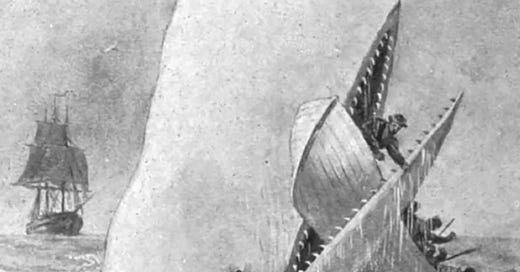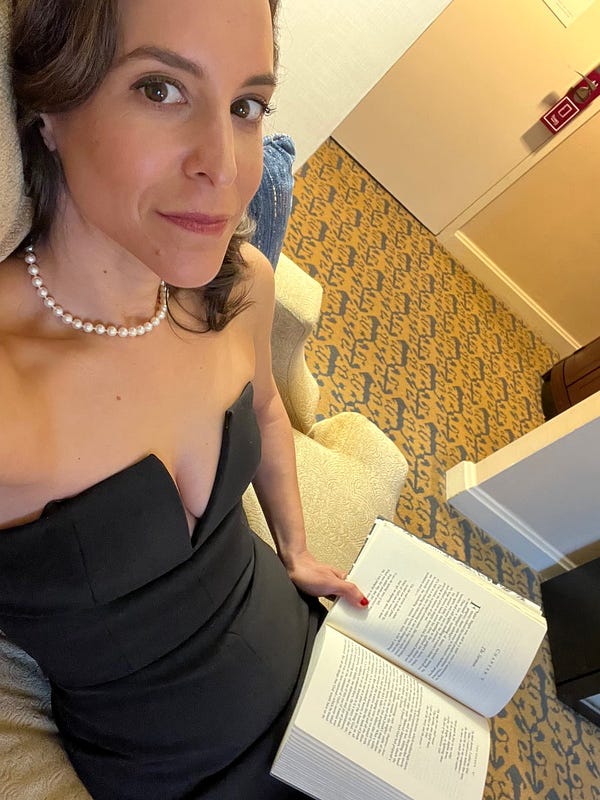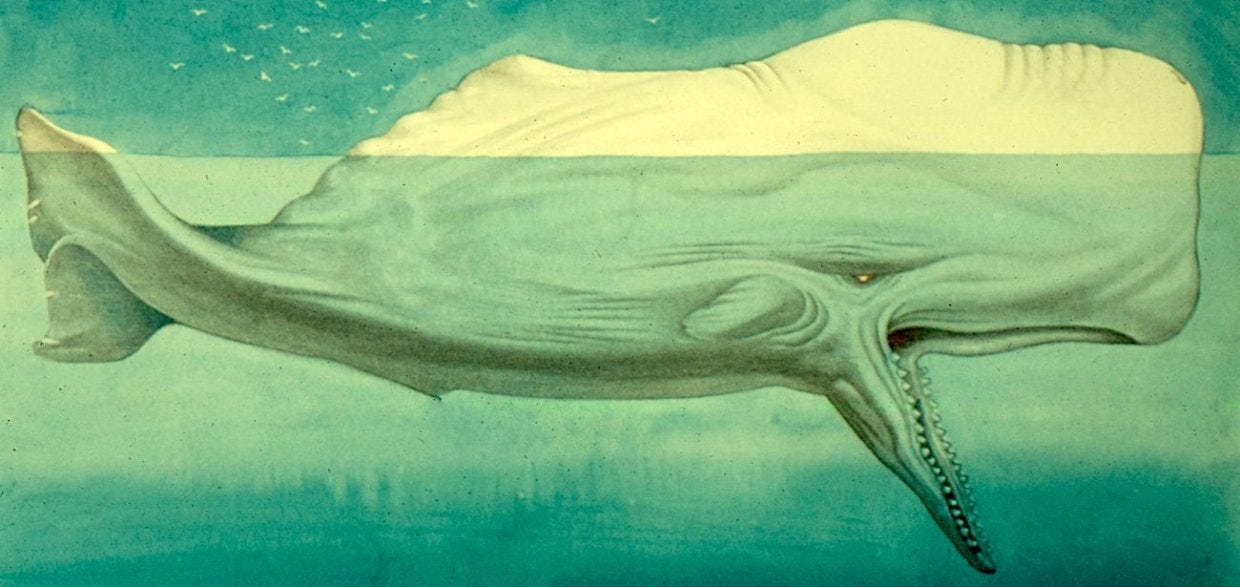I’ve long forgotten what compelled me to buy a new copy of Moby-Dick, but John F. Kennedy inspired me to exhume it from my to-read pile’s dusty pillar. Young Jack, the subject of my next book, was a man of the sea. I am more of an acquaintance. I had the same relationship with Moby-Dick, assigned reading I checked off in college, yet it suddenly felt essential to understanding Kennedy. That contention has proved untrue, but it is somewhat useful to the manuscript. To be a good writer, one must read good writers, and Melville is unparalleled:
“That unaccountable cone.” (Whale dick.)
“[Ahab] lived in the world, as the last of the Grisly Bears lived in settled Missouri
“How I wish I could fist a bit of old-fashioned beef in the forecastle.”
It turns out that revisiting Moby-Dick, or finally surrendering to it, isn’t an unusual impulse. Talia Lavin, formerly of the New Yorker, hosts the podcast Big Moby-Dick Energy. Since I posted about it, Ruth Franklin, author of Shirley Jackson: A Rather Haunted Life, has checked in on my progress. And Josie Duffy Rice, former president of The Appeal and host of Unreformed: The Story of the Alabama Industrial School for Negro Children, outed Caity Weaver, a New York Times writer, as a fan.
This was a thrilling development. Caity Weaver’s mind is a wild expanse. Below, I note her writing is similar to Melville’s (”Energetic. Intellectual. Deranged.”), and have long harbored the contention that she will one day write the Great American [whatever the hell she pleases]. Until then, Caity deigned to join me for this Q&A, which includes, at the end, an issue she takes with Melville: “I don't understand how Ahab was able to, by hand, nail a gold coin to the ship's mast.”
I wanted to reward her efforts with an answer, so I turned to “whale Twitter.” The responses were so good, I feel compelled to share an excessive number, so I’m sending out a second Caity Weaver, national treasure, newsletter tomorrow.
Alexis Coe: Caity, you love Moby-Dick! When did you read it?
Caity Weaver: Thank you so much for asking. One of my joys in life since reading Moby-Dick is talking to other people about reading Moby-Dick. I read it for the first time in 2022, on the recommendation of my husband, who had recommended it to me once or twice a year since we first started dating (back when Barack Obama was president -- I felt no particular urgency to get to it, since it was published in 1851). I did it as an audiobook, which I know some people consider cheating -- as if an audiobook is somehow an "easier" version of the text, or equivalent to watching a movie. Ridiculous. I expend the same mental effort following the story aurally as I would reading the words on the page. The only difference is that an audiobook leaves my hands free to perform rote tasks, like doing dishes -- and spares me from having to lug around a 600ish page book, which I probably would never have done. I am not anti-literacy! But there's nothing inherently nobler to me about reading a word than listening to it. It's not a sign of special intelligence. Just a sign you have memorized the characters we use to transcribe the sounds of human speech. (A skill that will likely prove useful throughout your life!) I enthusiastically endorse going the audio route for Moby-Dick.
Alexis: What did you make of the prose? You've got a similar vibe as Melville: Energetic. Intellectual. Deranged.
Caity: I loved this book immediately, from the first paragraph, which was so much funnier than I expected it would be. (The line about how our narrator finds himself, in periodic bouts of depression, "involuntarily pausing before coffin warehouses," is what hooked me.) I loved the prose. My husband had warned me that there would be long passages just describing, like, the shapes of various pieces of ship equipment, so I was dreading those sections -- but I enjoyed them too! The plot was thrilling, of course (I didn't know the ending, so I was genuinely curious to see how it would all shake out), but I especially loved learning so much about working on a 19th-century whaling ship. I've read many novels written in the past -- set, obviously, in the past -- but none that I could rely on as a step-by-step guide to earning a livelihood if I was suddenly magically transported into the past with nothing but the clothes on my back -- something I worry about often. I have no idea how to, for instance, make a window -- but after reading Moby-Dick, I would, at least, have my bearings on a whaling vessel, I think. I would understand the basic processes, occupations, goals, logistics, etc. The passage about squeezing the whale sperm that smelled "literally and truly, like the smell of spring violets" made me laugh out loud. I want to do that!

Alexis: Cast yourself in the film adaptation. I'm the Pequod, a 19th-century fictional whaling ship.
Caity: My constant thought reading it was that I can't believe this rollicking adventure hasn't been made into a modern prestige mini-series yet. The cast is so naturally diverse. It's like the Fast & Furious movies. I'm sorry to say the character I related to most was Ahab. Confidently dragging a ship full of innocent people into peril on an obsessive quest for pointless vengeance? Something I would do. There was one passage in particular, about how (before the main voyage of the novel) everyone assumed Ahab went crazy briefly at sea when the whale bit off his leg but recovered once he got back on shore, and thus was well enough to go back out again -- only he DIDN'T recover; "Ahab's full lunacy subsided not, but deepeningly contracted, like the unabated Hudson, when that noble Northman flows narrowly, but unfathomably through the Highland gorge"; "not one jot of Ahab's broad madness had been left behind"; "his special lunacy stormed his general sanity, and carried it, and turned all its concentrated cannon upon its own mad mark; so that far from having lost his strength, Ahab, to that one end, did now possess a thousand fold more potency than ever he had sanely brought to bear upon any one reasonable object" -- that is exactly how I would describe my self-appointed mission to obsessively monitor Meghan & Harry's (at that point) years-long failure to fulfill the terms of their Spotify contract. (I read the book before Meghan's podcast was finally released -- my white whale.)
Alexis: Let's knock some hats off!
Caity: Two small complaints about the book: I don't like that the name "Moby-Dick" is never explained. (Apparently, it was inspired by a real whale called "Mocha Dick", named after an island near where it was killed -- but Melville never explained why "Moby" instead of...literally any other word or name.)
And I don't understand how Ahab was able to, by hand, nail a gold coin to the ship's mast. It seems like it would be really hard to drive a nail through a coin. Then again, I've never tried to do it, so maybe it's easier than I think.
Alexis: Research is my love language. I want to get to the bottom of this for you.
And then I did. Stay tuned for Caity Weaver’s Doobloons: Part II, dropping tomorrow.
UPCOMING PUBLIC EVENTS:
March 23rd: Keynote on George Washington. Raynham Hall Museum. Oyster Bay, New York.
April 11th: In conversation with Alexandra Petri. The Bell House. Brooklyn, New York.
May 17th: Interviewed by Christy S. Coleman. The Jamestown Settlement. Williamsburg, Virginia.








